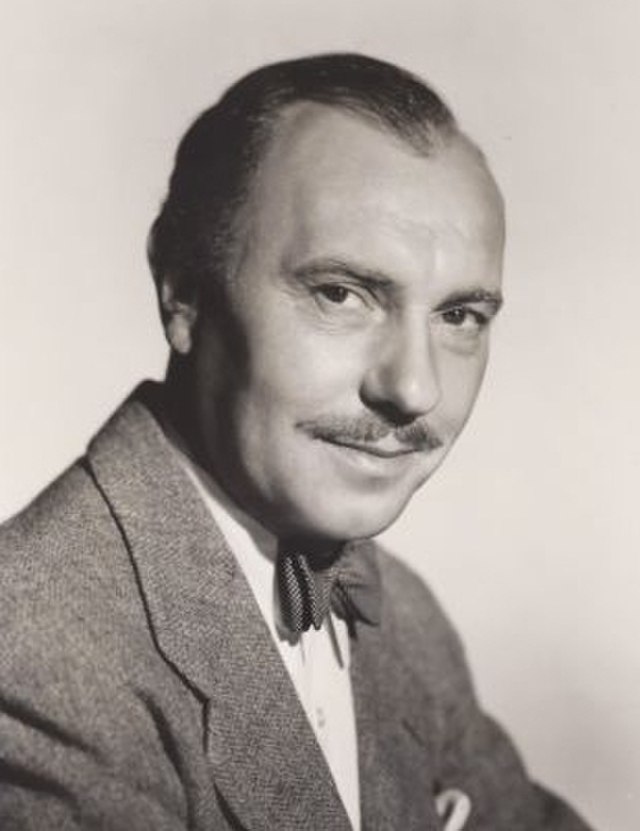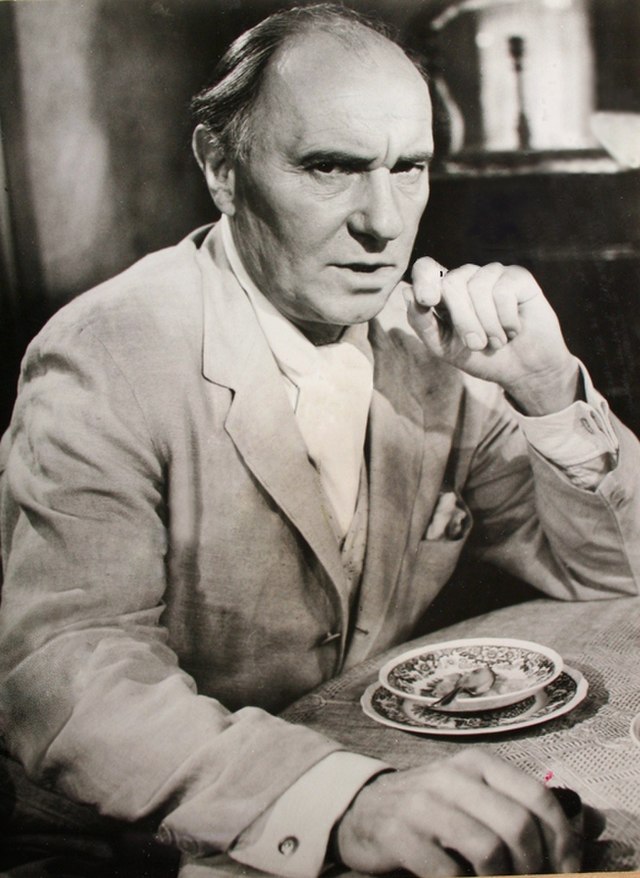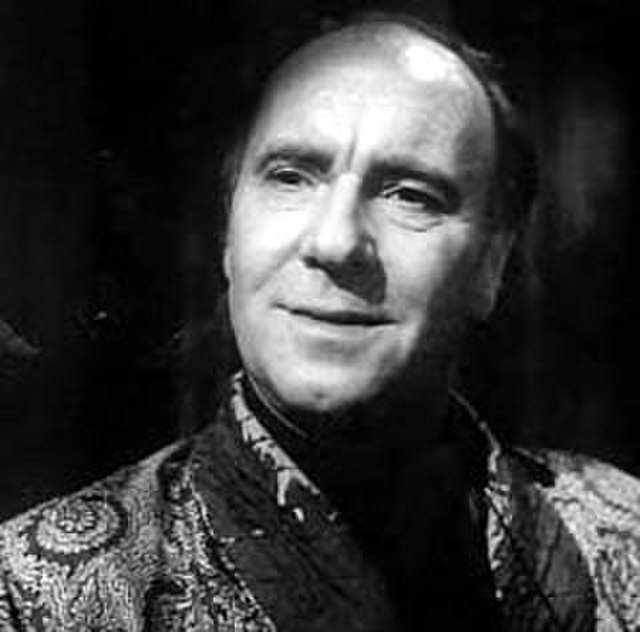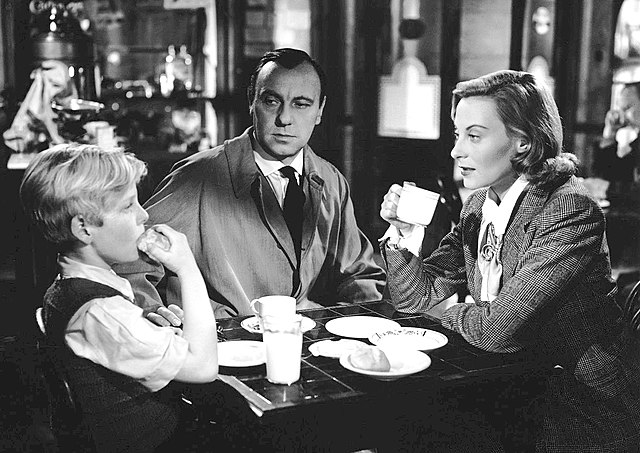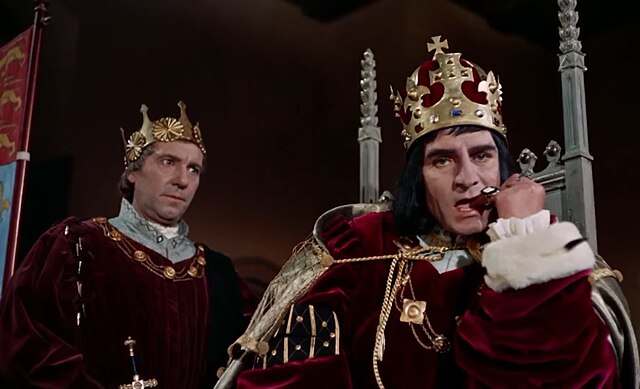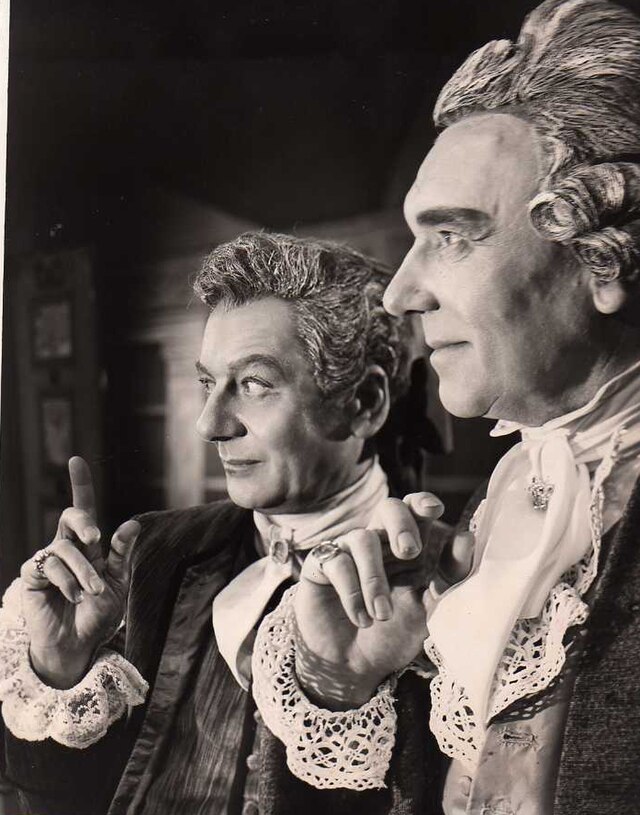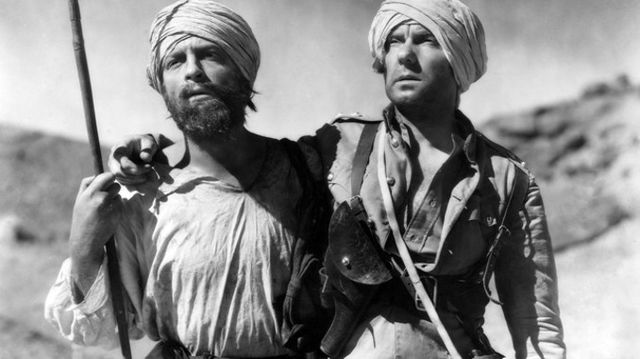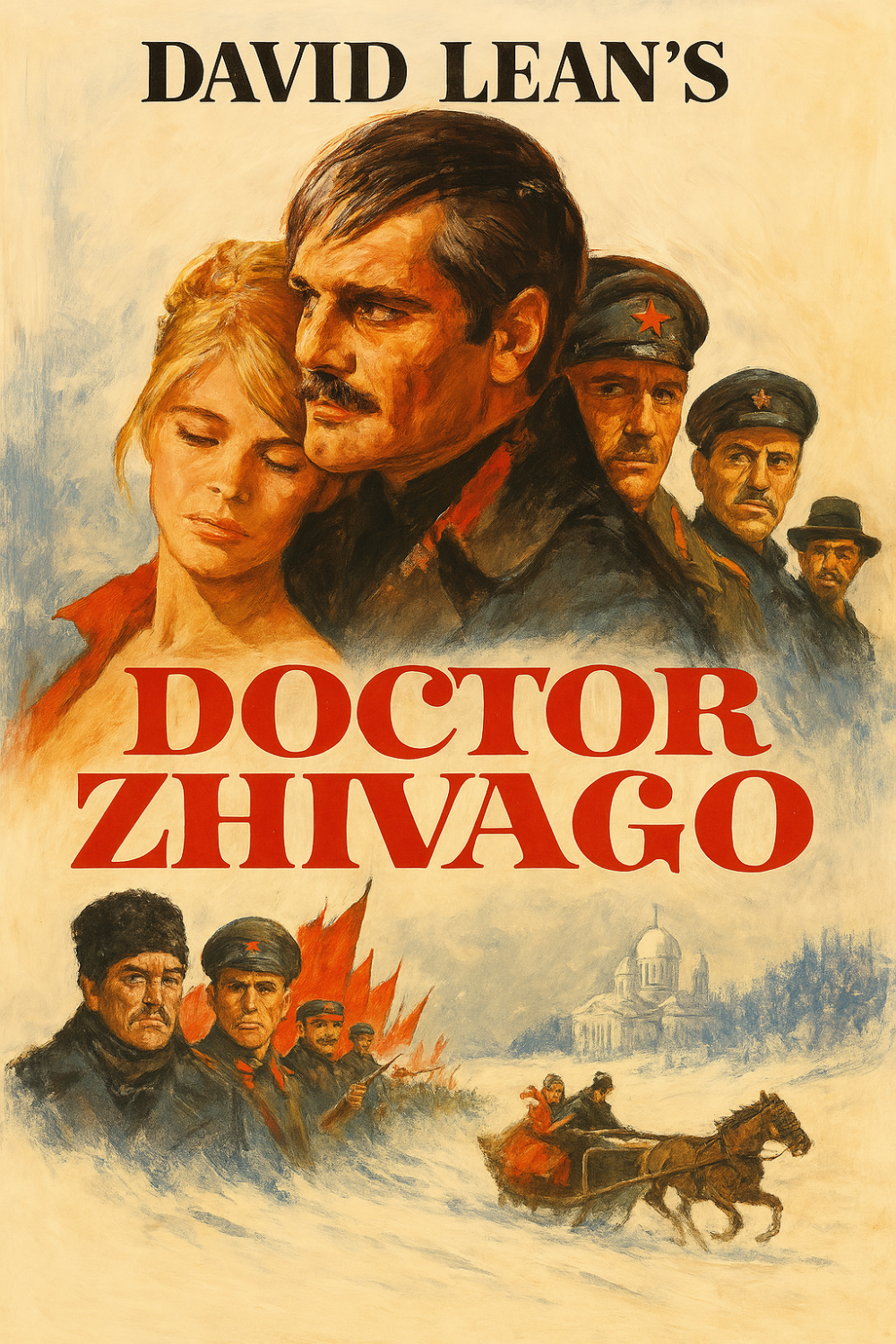Ralph Richardson (1902 – 1983)
Biography and Movie Career
Sir Ralph David Richardson (1902–1983) was one of the finest and most beloved actors of the 20th century, a man whose artistry brought a sense of humanity, warmth, and enigmatic charm to both stage and screen. Known for his expressive voice, whimsical yet profound performances, and gentle eccentricity, Richardson became a cornerstone of British theatre and a revered character actor in international cinema.
Early Years and Family Background
Ralph Richardson was born on December 19, 1902, in Cheltenham, Gloucestershire, England, the third son of Arthur Richardson, a painter and art teacher, and Lydia Russell, an accomplished portrait artist. His upbringing was marked by complexity: when Ralph was just four years old, his father left the family to join a religious order, effectively abandoning his wife and sons. Ralph was raised primarily by his mother, who became a devout Quaker and instilled in him a deep, quiet sense of introspection and humility that would stay with him all his life.
Although he did not come from a theatrical background, the arts were in his blood. As a young man, he intended to become a painter like his father and enrolled at the Slade School of Fine Art in London. But the lure of the stage proved too strong, and it was during these early years in London that he saw a performance of Hamlet that ignited a spark—an irresistible calling that would change the course of his life.
The Path Toward Success
Richardson’s path to acting was neither conventional nor easy. After leaving Slade, he trained in repertory theatre and made his stage debut in 1921 in Brighton. He honed his skills in provincial theatres, notably at the Birmingham Repertory Theatre, where he began developing a reputation for his keen emotional sensitivity and intelligence as an actor.
Throughout the 1930s, he steadily gained ground in the London theatre scene, often playing character roles that highlighted his thoughtful style. In 1936, he joined the Old Vic Theatre, a revered institution that became central to his development. There, he shared the stage with Laurence Olivier and John Gielgud, forming a legendary triumvirate of English acting talent. Together, they revived interest in Shakespearean drama and transformed the Old Vic into a national cultural treasure.
Richardson was knighted in 1947, becoming Sir Ralph Richardson, in recognition of his immense contributions to the British stage. Unlike many of his contemporaries, who craved attention, he remained modest, even uncomfortable with public praise. He once remarked, “Acting is the ability to dream on cue.”
Film Career
Though Richardson always preferred the immediacy and intimacy of the stage, his screen presence was no less remarkable. He began appearing in films in the 1930s but came to prominence after World War II.
Some of his most celebrated performances include:
• The Fallen Idol (1948) – A masterful portrayal of a butler entangled in mystery.
• The Heiress (1949) – Opposite Olivia de Havilland, showing his capacity for austere authority.
• The Sound Barrier (1952) – For which he won a BAFTA Award.
• Doctor Zhivago (1965) – A supporting role in David Lean’s sweeping epic.
• Time Bandits (1981) – Where he delighted a new generation as the Supreme Being.
• Greystoke: The Legend of Tarzan (1984) – His final film, released posthumously, which earned him a posthumous Oscar nomination.
He brought dignity and mystery to every character, often infusing roles with a touch of otherworldliness—never quite playing a part the same way twice.
Personal Life and Marriage
In 1924, Richardson married Muriel “Kit” Hewitt, a young actress he had met early in his career. Their marriage lasted until her death in 1980, an impressive span of over 55 years. Theirs was a loyal, deeply affectionate relationship, though Kit often remained behind the scenes, preferring domestic life to the limelight. They had one child, Charles Richardson, born in 1945, who became a photographer.
Though intensely private, Richardson was known among friends for his childlike wonder, kindness, and idiosyncratic humor. He loved playing practical jokes and had a fondness for whimsical hats and collecting odd objects. Unlike many of his contemporaries, he stayed far from gossip and scandal. He was, by all accounts, a devoted husband and father.
Passions and Personality
Beyond acting, Richardson had a deep love for nature, gardening, and painting—remnants of his original artistic training. He was fascinated by the mystical and the poetic, often quoting Blake or Yeats, and he saw acting as a sacred, almost metaphysical craft.
He was also known for being difficult to interview; he would often answer questions with sly evasions or riddles. To Richardson, the mystery of performance was best left intact. He valued spontaneity over theory and instinct over rehearsal. He once quipped, “The most precious thing in life is its uncertainty.”
Final Years and Death
Ralph Richardson remained active in his later years, both on screen and stage, though his health began to decline in the early 1980s. He continued to work almost until the end of his life. His final performance, in Greystoke: The Legend of Tarzan, was filmed shortly before his death and released the following year.
Richardson died on October 10, 1983, at the age of 80, from a stroke. He passed away peacefully at his home in London. His loss was deeply felt across the world of theatre and film.
He was laid to rest in Highgate Cemetery, one of London's most historic and beautiful resting places.
Physical Characteristics of Sir Ralph Richardson:
• Height: Approximately 5 feet 10 inches (178 cm)
• Build: Slim to medium build; maintained a trim and upright posture, especially notable in stage roles
• Hair: Light brown in his youth, turning silver-grey in later years
• Eyes: Blue-grey, often described as expressive, sometimes with a twinkle of mischief
• Voice: Distinctive, mellow and resonant with a slightly whimsical lilt—considered one of his most powerful tools as an actor
Facial Features:
• High forehead
• Prominent eyebrows
• Often a solemn or enigmatic expression
• In later years, a deeply lined face, lending him gravitas and character
The Art of Subtlety – Ralph Richardson’s Acting Style
Sir Ralph Richardson was the kind of actor who defied easy categorization. His performances weren’t about grandeur or self-display; they were about texture, nuance, and mystery. Where many actors strived for clarity and impact, Richardson embraced ambiguity and contradiction. His style was deeply human—at once whimsical and grounded, aloof and intimate, theatrical and understated.
Instinct Over Technique
Richardson was famously skeptical of method acting and formal theories of performance. He often claimed to have no “technique” at all—an assertion that masked a highly refined sense of timing, emotion, and control. He acted from instinct, reacting to the energy of the moment, the audience, or the rhythm of the text.
Rather than build a character from psychological analysis, he would discover the role from the outside in: a walk, a gesture, a way of speaking. This intuitive approach gave his performances an air of spontaneity, as though the character was thinking things through in real time rather than delivering rehearsed emotions.
Master of Voice and Gesture
One of Richardson’s most powerful tools was his voice. It could be mellow or sharp, warm or sardonic, commanding or playful. He had a gentle drawl and a peculiar lilt that made even the most mundane line sound freshly minted. Unlike some of his peers who used their voices like trumpets, Richardson’s was more like a flute—light, lyrical, and often ironic.
His gestures were just as expressive: small, specific, and often surprising. He had an uncanny ability to make stillness speak volumes or to infuse a minor movement—adjusting a cuff, cocking an eyebrow—with meaning. Watching him was like watching a finely tuned instrument being played with great precision and wit.
Theatrical Eccentricity
There was always something slightly odd, almost dreamlike, in Richardson’s performances. He leaned into the eccentricities of his characters, often imbuing them with an unpredictable, even mischievous quality. Whether he was playing kings, butlers, fathers, or sorcerers, there was often an undercurrent of irony, a glint in the eye that suggested he knew something the audience didn’t.
This quality could turn a conventional role into something strange and wonderful. His characters often seemed to exist slightly to the side of the world they inhabited—as if they were playing their own private game. And yet this very idiosyncrasy made them more believable, more real, because they resembled the contradictions we recognize in ourselves.
Restraint and Depth
Richardson’s performances were rarely emotional in the overt sense. He didn’t “emote”—he revealed. Pain, joy, fear, and love would surface gradually, almost reluctantly, like the shifting of deep water. This gave his work a haunting emotional resonance. You felt his characters’ inner lives even when they said very little.
This restraint made him an ideal interpreter of repressed, morally conflicted, or spiritually torn figures. In The Fallen Idol, he turned a seemingly ordinary butler into a tragic figure of quiet desperation. In The Sound Barrier, he made an aloof patriarch deeply compelling by showing the cost of his ambition in silences more than speeches.
Collaboration and Selflessness
Unlike many stars, Richardson was not interested in dominating the stage or the screen. He was a generous actor—always present, always listening, always shaping his performance around others. He never tried to outshine his co-stars; instead, he illuminated them. He elevated the entire ensemble by focusing on the truth of the moment rather than the spotlight.
He was also deeply humble. He once said, “The most precious thing in life is its uncertainty,” a philosophy that extended to his craft. He never wanted to “nail” a performance. Instead, he preferred to keep it open, alive, mysterious—changing subtly night after night.
________________________________________
A Performer of Paradoxes
In the end, Sir Ralph Richardson’s acting style was defined by paradox:
• He was theatrical, yet understated.
• Eccentric, yet authentic.
• Emotionally distant, yet profoundly moving.
• Spontaneous, yet utterly precise.
He made the strange familiar and the familiar strange. He left audiences with a sense of wonder—never fully understanding the man behind the mask, but always feeling that they had seen something truthful and rare. That, perhaps, was his greatest artistry: not to explain life, but to reflect its depth, mystery, and quiet absurdity.
Memorable Quotes by Sir Ralph Richardson
• "The most precious thing in life is its uncertainty."
• "Acting is merely the art of keeping a large group of people from coughing."
• "You’ve got to have a dream. If you don’t have a dream, how are you going to make a dream come true?"
• "I hate talking about acting. What is the point of it? It’s like talking about the smell of a flower."
• "I think the most brilliant actors don't talk about acting. They just do it."
• "I’m not much of a thinker. I prefer to let things happen."
• "You mustn’t take an actor at face value."
What Others Said About Ralph Richardson
Laurence Olivier (fellow knight and frequent collaborator):
"He was the most complete actor I have ever worked with."
________________________________________
John Gielgud:
"Ralph was a strange man but a wonderful actor. He had something the rest of us didn’t—an odd, almost animal intuition."
________________________________________
Alec Guinness:
"He was a curious mixture of child and sage, a magician of sorts."
________________________________________
Peter Hall (founder of the Royal Shakespeare Company):
"He could do things no one else could even attempt. His performances seemed to grow out of the floorboards."
________________________________________
David Lean (director of The Sound Barrier):
"Ralph brought a mystery to the screen. You never quite knew what he was thinking, and that was captivating."
________________________________________
Critics and Commentators:
• Kenneth Tynan (renowned theatre critic):
"He was the great magician of the British theatre."
• The Times (UK), obituary, 1983:
"Ralph Richardson brought a kind of gleaming authenticity to the stage, as though he had slipped in from some other, more truthful world."
________________________________________
General Observations from Peers and Press
• He was often described as "enigmatic", "elusive", and "eccentric", yet also "kind-hearted" and "generous on stage."
• Fellow actors remarked on how he never tried to upstage anyone, and yet he invariably drew attention due to the depth of his presence.
• Many spoke of his whimsical personality off-stage: a man who loved odd hats, small jokes, and gardening as much as Shakespeare.
Awards and Recognition – Sir Ralph Richardson
Knighthood
• Knight Bachelor (1947)
Ralph Richardson was knighted by King George VI in 1947 for his services to the theatre, becoming one of the "Three Knights" of British acting, alongside Sir Laurence Olivier and Sir John Gielgud. This was one of the highest honors for a British performer and marked his standing as a national cultural figure.
________________________________________
Film Awards
BAFTA Awards (British Academy of Film and Television Arts)
• Won: Best British Actor – The Sound Barrier (1952)
Richardson received the BAFTA for his performance as Sir John Ridgefield, a driven aviation mogul, in this David Lean film.
• Nominated: Best British Actor – The Holly and the Ivy (1954)
• Nominated: Best Supporting Actor – Greystoke: The Legend of Tarzan, Lord of the Apes (1984)
Posthumous nomination for his poignant final role as the Sixth Earl of Greystoke.
________________________________________
Academy Awards (Oscars)
• Nominated: Best Supporting Actor – Greystoke: The Legend of Tarzan, Lord of the Apes (1984)
Though he passed away before the Oscars ceremony, this posthumous nomination honored his gentle and touching portrayal of the grandfatherly aristocrat.
________________________________________
Other Major Film & Theatre Awards
New York Film Critics Circle Award
• Won: Best Supporting Actor – The Heiress (1949)
For his stern yet tragically nuanced portrayal of Dr. Sloper, father to Olivia de Havilland's character.
________________________________________
Evening Standard Theatre Awards
• Special Recognition Award (1959)
Richardson was acknowledged for his outstanding contribution to British theatre.
________________________________________
Venice Film Festival
• Volpi Cup Nomination: Best Actor – The Sound Barrier
Though he didn’t win, his performance garnered international critical acclaim.
________________________________________
Honorary and Lifetime Recognitions
• Companion of Honour (CH) (declined)
It is reported that Richardson declined further honors later in life, possibly out of modesty or personal principle.
• Fellow of the Royal Society of Literature (FRSL)
Though primarily an actor, Richardson's contribution to English letters and culture was recognized with this fellowship.
• Commemorated in Theatre Memorials
o A bronze bust of Sir Ralph Richardson stands in the National Theatre, London.
o His legacy is also marked at Highgate Cemetery, where many great British figures are buried.
________________________________________
Tributes and Cultural Recognition
• Tribute Performances & Memorials
Following his death in 1983, many tributes were held across the UK theatre world, including a special evening at the National Theatre and reflections from fellow actors such as John Gielgud.
• Frequently Cited in Acting Literature
Richardson is often quoted in acting handbooks and biographies as an example of instinctive, naturalistic, and emotionally rich performance.
Ralph Richardson Movies
1930s:
• 1933: "The Ghoul"
Richardson plays Nigel Hartley, a solicitor entangled in a horror tale involving an ancient Egyptian curse and a resurrected professor.
• 1936: "Things to Come"
In this science fiction epic, Richardson portrays "The Boss," a warlord in a dystopian future grappling with the consequences of perpetual war and societal collapse.
• 1937: "Thunder in the City"
Richardson appears as Duke of Glenavon in this comedy about an American salesman attempting to introduce modern marketing techniques to England.
• 1937: "The Divorce of Lady X"
A romantic comedy where Richardson plays Lord Mere, a man entangled in misunderstandings and mistaken identities following a masquerade ball.
• 1938: "South Riding"
Richardson portrays Robert Carne, a conservative landowner facing personal and political challenges in a Yorkshire community.
• 1939: "The Four Feathers"
In this adventure drama, Richardson plays Captain John Durrance, a British officer blinded during a mission in Sudan, exploring themes of courage and redemption.
1940s:
• 1940: "The Lion Has Wings"
A wartime propaganda film featuring Richardson as Wing Commander Richardson, showcasing Britain's air defense efforts during World War II.
• 1942: "The Day Will Dawn" (also known as "The Avengers")
Richardson plays Captain Alford, involved in a resistance movement against Nazi occupation in Norway.
• 1948: "The Fallen Idol"
In this thriller, Richardson portrays Baines, a butler whose young charge suspects him of murder, leading to a tense narrative of loyalty and deception.
• 1949: "The Heiress"
Richardson plays Dr. Austin Sloper, a domineering father skeptical of his daughter's suitor, in this drama exploring themes of love, betrayal, and familial control.
1950s:
• 1951: "Outcast of the Islands"
Richardson portrays Captain Lingard, a trader who becomes entangled in moral and ethical dilemmas in the Malay Archipelago.
• 1952: "The Sound Barrier"
In this drama, Richardson plays Sir John Ridgefield, an aviation magnate obsessed with breaking the sound barrier, highlighting human ambition and technological advancement.
• 1955: "Richard III"
Richardson takes on the role of the Duke of Buckingham, a key ally turned adversary to the titular king in Shakespeare's historical tragedy.
• 1959: "Our Man in Havana"
In this spy comedy, Richardson portrays "C," a British intelligence officer who unwittingly becomes involved in a web of deception in pre-revolutionary Cuba.
1960s:
• 1962: "Long Day's Journey into Night"
Richardson delivers a powerful performance as James Tyrone Sr., the patriarch of a dysfunctional family grappling with addiction and regret.
• 1965: "Doctor Zhivago"
In this epic romance, Richardson plays Alexander Gromeko, the father-in-law of the titular character, navigating the tumultuous landscape of revolutionary Russia.
• 1966: "Khartoum"
Richardson portrays William Ewart Gladstone, the British Prime Minister, in this historical drama centered on General Gordon's defense of Khartoum against Sudanese forces.
• 1969: "Oh! What a Lovely War"
An anti-war musical satire where Richardson appears as Sir John French, commenting on the absurdities and tragedies of World War I.
1970s:
• 1970: "The Bed Sitting Room"
In this surreal comedy, Richardson plays Lord Fortnum, a character undergoing bizarre transformations in a post-apocalyptic London.
• 1973: "O Lucky Man!"
Richardson takes on multiple roles, including Sir James Burgess and Monty, in this satirical journey through British society.
• 1975: "Rollerball"
In this dystopian sports drama, Richardson appears as the Librarian, overseeing a world where corporate-controlled violent games dominate society.
• 1977: "Jesus of Nazareth"
Richardson portrays Simeon, the devout elder who recognizes the infant Jesus as the Messiah in this biblical epic.
1980s:
• 1981: "Time Bandits"
In this fantasy adventure, Richardson plays the Supreme Being, overseeing a group of time-traveling dwarfs causing mischief across history.
• 1981: "Dragonslayer"
Richardson portrays Ulrich, an aged sorcerer guiding a young apprentice in a quest to defeat a fearsome dragon terrorizing a kingdom.
• 1984: "Greystoke: The Legend of Tarzan, Lord of the Apes"
In his final film role, Richardson plays the Sixth Earl of Greystoke, welcoming his long-lost grandson, raised by apes, back to civilization.

